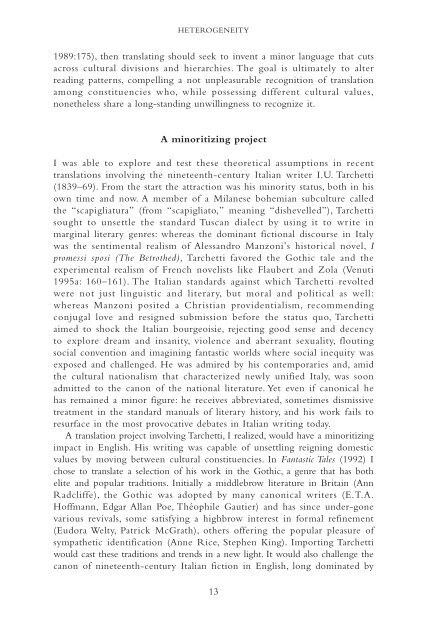THE SCANDALS OF TRANSLATION
9781134740642_sample_893345
9781134740642_sample_893345
Create successful ePaper yourself
Turn your PDF publications into a flip-book with our unique Google optimized e-Paper software.
HETEROGENEITY1989:175), then translating should seek to invent a minor language that cutsacross cultural divisions and hierarchies. The goal is ultimately to alterreading patterns, compelling a not unpleasurable recognition of translationamong constituencies who, while possessing different cultural values,nonetheless share a long-standing unwillingness to recognize it.A minoritizing projectI was able to explore and test these theoretical assumptions in recenttranslations involving the nineteenth-century Italian writer I.U. Tarchetti(1839–69). From the start the attraction was his minority status, both in hisown time and now. A member of a Milanese bohemian subculture calledthe “scapigliatura” (from “scapigliato,” meaning “dishevelled”), Tarchettisought to unsettle the standard Tuscan dialect by using it to write inmarginal literary genres: whereas the dominant fictional discourse in Italywas the sentimental realism of Alessandro Manzoni’s historical novel, Ipromessi sposi (The Betrothed), Tarchetti favored the Gothic tale and theexperimental realism of French novelists like Flaubert and Zola (Venuti1995a: 160–161). The Italian standards against which Tarchetti revoltedwere not just linguistic and literary, but moral and political as well:whereas Manzoni posited a Christian providentialism, recommendingconjugal love and resigned submission before the status quo, Tarchettiaimed to shock the Italian bourgeoisie, rejecting good sense and decencyto explore dream and insanity, violence and aberrant sexuality, floutingsocial convention and imagining fantastic worlds where social inequity wasexposed and challenged. He was admired by his contemporaries and, amidthe cultural nationalism that characterized newly unified Italy, was soonadmitted to the canon of the national literature. Yet even if canonical hehas remained a minor figure: he receives abbreviated, sometimes dismissivetreatment in the standard manuals of literary history, and his work fails toresurface in the most provocative debates in Italian writing today.A translation project involving Tarchetti, I realized, would have a minoritizingimpact in English. His writing was capable of unsettling reigning domesticvalues by moving between cultural constituencies. In Fantastic Tales (1992) Ichose to translate a selection of his work in the Gothic, a genre that has bothelite and popular traditions. Initially a middlebrow literature in Britain (AnnRadcliffe), the Gothic was adopted by many canonical writers (E.T.A.Hoffmann, Edgar Allan Poe, Théophile Gautier) and has since under-gonevarious revivals, some satisfying a highbrow interest in formal refinement(Eudora Welty, Patrick McGrath), others offering the popular pleasure ofsympathetic identification (Anne Rice, Stephen King). Importing Tarchettiwould cast these traditions and trends in a new light. It would also challenge thecanon of nineteenth-century Italian fiction in English, long dominated by13


